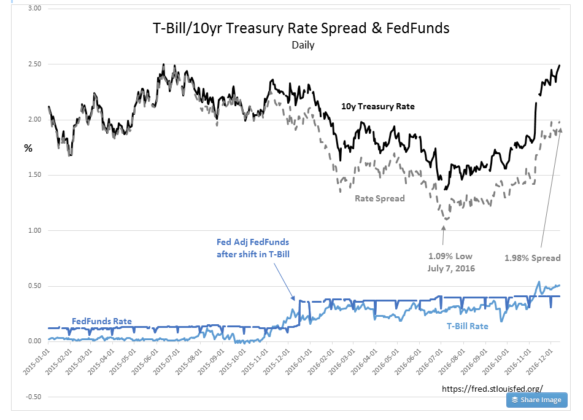“Davidson” submits:
We have many decades of the myth at the Federal Reserve controls interest rates and economic outcomes:
- Confusion reigns concerning the impact of higher rates. Are they as good as advisors are saying for economic expansion?
- Some advisors say higher rates are good early in the investment cycle but not good later on. How does one tell the difference?
- Does the Fed control market rates?

The historical data we have does not support many beliefs investors and advisors have relied on for many years. Careful analysis reveals some simple truths:
1) Rates have risen since the election. It is a response to the expectation that new administration will reduce many regulations impeding economic expansion. Optimism has improved and capital has shifted out of fixed income and into equities and commodities. The Fed has had no impact on this shift.
2) Long-term rates have risen more than short-term rates and already permitted banks and lending institutions to expand lending to businesses. The T-Bill/10yr Treasury rate spread which began to widen in July 2016 has become much wider since the election. When long-term rates rise faster than short-term rates, there is always an expansion in lending and equity prices rise. When short-term rates rise faster than long-term rates, lending slows. When the T-Bill/10yr Treasury rate spread shifts to 0.0%, economic activity and equity markets stop rising and enter correction-every time!
3) Close examination of Fed actions on the Fed Funds rate reveal that the Fed acts after T-Bills have shifted. The Fed’s goal is to keep Fed Fund rates above T-Bill rates. They respond 1mo-3mos after there has been a market determined shift in T-Bill rates.
There are many market myths. Value Investors do not invest with myths. They invest using facts! It is why they are called Value Investors. The current environment with lending beginning to expand is very positive for equity investors. The Fed will raise rates as they have done historically to keep up with market induced changes in T-Bill rates. What the Fed does with Fed Fund rates has no impact on economic growth.
Summary:
Investors should ignore Fed actions on Fed Fund rates. There is no impact on economic activity. Investors should focus on market induced changes to the T-Bill/10yr Treasury rate spread. A widening spread portends higher equity prices.














Leave A Comment